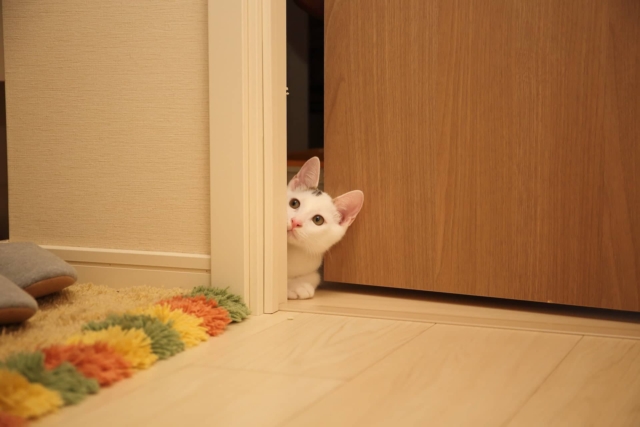
Cats are known for their independent and mysterious nature, but sometimes their behavior can leave their owners confused and concerned. One common behavior that many cat owners have noticed is their feline friend hiding when visitors arrive. This behavior can be attributed to social anxiety, a condition that affects many cats. Understanding the reasons behind this behavior can help cat owners provide the necessary support and create a safe environment for their furry companions.
The instinctual nature of cats
To understand why cats hide when visitors arrive, it’s important to recognize their instinctual nature. Cats are natural predators and have a strong instinct to protect themselves. When faced with unfamiliar people or situations, cats may feel threatened and choose to hide as a way of self-preservation. This behavior is deeply ingrained in their DNA and goes back to their wild ancestors.
Common reasons why cats hide when visitors arrive
There are several common reasons why cats hide when visitors arrive. One reason is the fear of the unknown. Cats are creatures of habit and prefer familiar environments and routines. The presence of strangers disrupts their sense of security, leading them to seek out hiding spots where they feel safe and protected. Additionally, some cats may have had negative experiences with visitors in the past, such as loud noises or rough handling. These traumatic experiences can leave a lasting impact and cause them to associate visitors with fear and anxiety.
Another possible reason is the territorial nature of cats. Cats are territorial animals, and the arrival of visitors can be seen as an intrusion into their space. They may choose to hide as a way of asserting their boundaries and maintaining control over their environment. Additionally, cats are highly sensitive to changes in their surroundings, and the presence of new people can disrupt their sense of balance and security.
The role of past experiences in your cat’s behavior
Past experiences play a significant role in shaping your cat’s behavior, including their reaction to visitors. Cats have long memories and can remember negative experiences for a long time. If your cat has had a traumatic encounter with a visitor in the past, they may associate all visitors with that negative experience and choose to hide as a defensive mechanism. It’s essential to be patient with your cat and understand that their behavior is a result of their past experiences.
How to help your cat overcome social anxiety
If your cat hides when visitors arrive, there are several steps you can take to help them overcome their social anxiety and feel more comfortable in the presence of guests.
Creating a safe space for your cat
Creating a safe space for your cat is crucial to help them feel secure when visitors arrive. This can be a designated room or area where your cat can retreat to when they feel overwhelmed. Make sure this space is equipped with their favorite toys, bedding, and a hiding spot. Allow your cat to access this space freely and avoid forcing them out of it.
Introducing visitors to your cat in a gradual manner
Introducing visitors to your cat gradually is key to helping them feel more at ease. Start by allowing your cat to observe visitors from a distance, without direct interaction. Gradually increase the exposure over time, always monitoring your cat’s body language for signs of stress. Encourage visitors to approach your cat calmly and gently, using positive reinforcement techniques.
The importance of positive reinforcement and rewards
Positive reinforcement is a powerful tool when it comes to helping your cat overcome social anxiety. Reward your cat with treats, praise, and playtime when they exhibit calm and relaxed behavior in the presence of visitors. This positive association will help them feel more comfortable and confident around guests. Avoid punishing or scolding your cat for hiding, as this will only reinforce their anxiety.
Seeking professional help for severe cases of social anxiety
In some cases, social anxiety in cats can be severe and require professional help. If your cat’s anxiety is significantly impacting their quality of life or causing aggressive behavior, it’s important to consult with a veterinarian or animal behaviorist. They can provide guidance, behavior modification techniques, and, if necessary, medication to help your cat overcome their social anxiety.
Conclusion
Understanding the reasons behind why cats hide when visitors arrive is the first step in helping them overcome social anxiety. Cats are complex creatures with unique personalities, and their behavior can be influenced by a variety of factors. By creating a safe space, introducing visitors gradually, using positive reinforcement, and seeking professional help when needed, cat owners can provide the support and care necessary for their feline friends to feel secure and confident in social situations.
Remember, patience and understanding are key when dealing with a socially anxious cat. With time and the right approach, your cat can learn to feel more comfortable and relaxed when visitors come knocking at the door.
If you enjoyed my article, I would appreciate you sharing it with your network.

Sima Ndlebe
Sima writes for CatBuzz. He is interested in Cats, Health and Fitness, and Entrepreneurship.
Published: 6 December 2023




